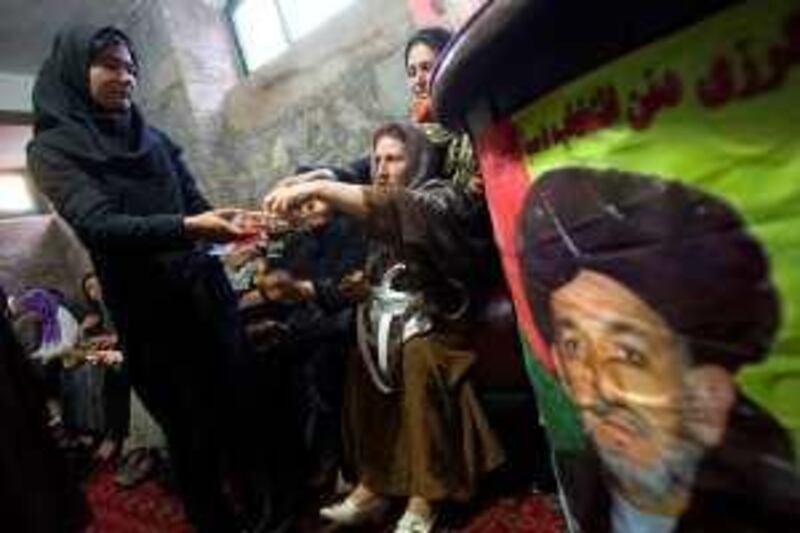NEW YORK // Afghan election officials declared Hamid Karzai president for another five-year term yesterday, ending two months of political uncertainty highlighted by voting fraud and violence. Mr Karzai emerged as the sole candidate after the withdrawal of his only rival, Abdullah Abdullah, on Sunday, gaining the incumbent a hard-won presidency amid mounting concerns over his credibility.
The two men were due to compete in a second round of voting on Saturday after the independent election commission threw out about one million fraudulent votes from the first round ballot of August 20. The UN-backed commission's chairman, Azizullah Lodin, announced Mr Karzai as the victor during a news conference in Kabul after the UN secretary general, Ban Ki-moon, touched down for an unscheduled visit to the Afghan capital.
The UN chief described the elections as "among the most difficult" ever to involve the world body and lamented the "insecurity, poor infrastructure, fraud, and weak or partial institutions" that blighted the vote. "This has been a difficult election process for Afghanistan and lessons must be learnt," Mr Ban said. "Afghanistan now faces significant challenges and the new president must move swiftly to form a government that is able to command the support of both the Afghan people and the international community."
The election commission previously cut the share of Mr Karzai's vote to just under the 50 per cent threshold needed for outright victory, declaring almost one-third of the incumbent's votes as fakes. His challenger, Mr Abdullah, won nearly one-third of the valid votes cast, but dropped out of the race last weekend, saying the run-off would not be free or fair following the fraud-marred first round.
Officials said they scrapped the November 7 ballot to save money and because of security concerns. Taliban insurgents were expected to continue a campaign of election violence that included the killing of five UN foreign staff during a raid on a guesthouse in Kabul last week. Installed after the Taliban were toppled by US-backed Afghan forces in 2001, a weakened Mr Karzai can now expect to come under increased pressure to reform an administration seen by many in the West as riddled with corruption.
Although the US Embassy in Kabul released a statement congratulating Mr Karzai and saying it looked "forward to working with him, his new administration, the Afghan people and our partners", many still have concerns about the incumbent. "The credibility of the Karzai government is not going to be simply decided by this election, it will now be decided by the actions the president takes over the coming days," a western official in Kabul said.
"The first test will be the formation of his cabinet. If he is serious about reform we need to see that." Daniel Markey, a regional expert from the US-based Council on Foreign Relations, said Mr Karzai should select ministers, police chiefs and other senior officials who will be acceptable to Afghanistan's backers in the West. "There needs to be some overture, even if it's symbolic, that breaks this pattern of deterioration of confidence and increased frustration," said Mr Markey, a former US state department official.
"There needs to be an injection of momentum into the process to shift the tide against this resurgent Taliban and convince members of the international community that there are benefits to staying engaged in Afghanistan, even if the leader of that country is tarnished." Mr Karzai's support base is mainly among the Pashtun, the country's largest ethnic group, who are predominant in the south and east, meaning he may come under pressure to strike a deal with his former rival, who is backed by Tajiks in the north.
Mr Abdullah campaigned strongly and emerged as a figurehead among what had in the past been a fractured opposition. Even though talks on a power-sharing deal broke down last week, according to western diplomats in Kabul, Mr Karzai will need to give up some key cabinet positions to Mr Abdullah's camp to make the government more representative. "Karzai has lost his legitimacy; he is a very weak president and he cannot govern without reaching out to Dr Abdullah," Haroun Mir, a Kabul-based political analyst, said. "So the ball is in Dr Abdullah's court."
While the conclusion to the election process means western countries with troops in Afghanistan will not have to risk more casualties securing another round of voting, Mr Karzai's victory presents new problems for the US administration. The US president, Barack Obama, has already been criticised for taking too long to decide whether to send as many as 40,000 more troops to Afghanistan. The success of Mr Karzai, who is seen as illegitimate by many in the United States, may make it more difficult to convince the US public of the wisdom of suffering ever more casualties in the war.
Mr Markey said it remains unclear whether Mr Obama will unveil a new policy towards Afghanistan now that the election process is over. @Email:jreinl@thenational.ae * With additional reporting by Reuters






